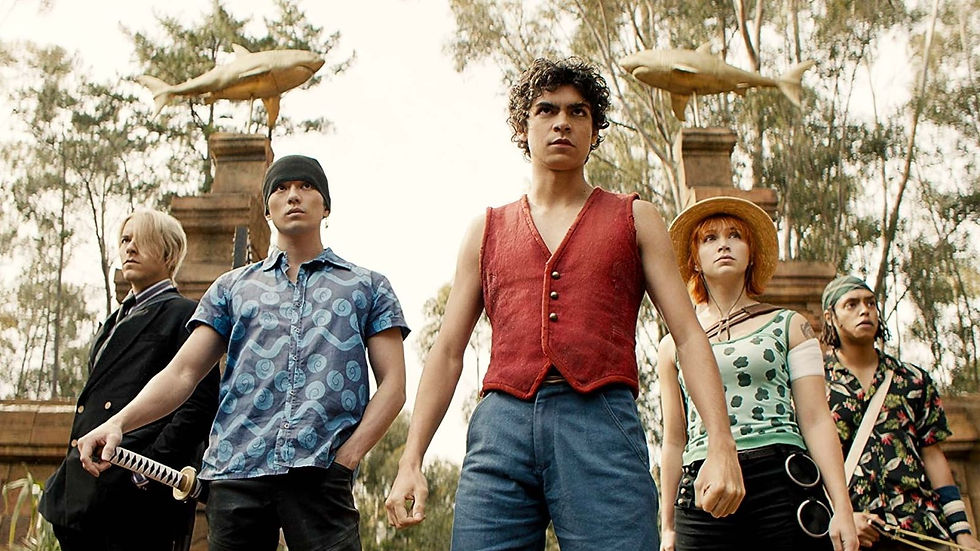Netflix's big hit: a review of the series "One Piece. The Big Score."
How the streaming giant finally managed to pull off a manga adaptation.
Ten years ago, the famous pirate Gold Roger was executed. Before he died, he revealed that he had hidden his treasure, the legendary Van Pees, somewhere on the Grand Line, thus beginning the Great Age of Pirates. All these years Manky D. Luffy, like many other boys, dreamed of becoming a pirate. What made him different from the rest were a few details: first, he wanted to become nothing less than a pirate king and find Van Pees. And secondly, Luffy had eaten a devil fruit that made his body rubbery and took away his ability to swim. But still, at the age of 18, he went to sea to meet his adventures and the future members of his loyal crew. Naturally, Luffy had many bright and crazy adventures ahead of him.

"One Piece" is probably the most famous shōnen in history. Eiichiro Oda, who created it, has been releasing chapters with enviable regularity since 1997. In that time, "Van Pees" has become a cultural phenomenon: it is one of the best-selling comic books in history, and it is the basis for an equally popular anime with over a thousand episodes. And that's not counting half a dozen full-length cartoons, three dozen video games, and countless merch. It's even surprising that the live-action series decided to film only now.
The authors of the Netflix-adaptation had a difficult task: to fit a huge story - or rather, part of it - into a fairly compact form of the series. And the show's creators decided to cover the first hundred chapters of the manga, in which many important events take place. And at the same time to capture some plot branches from later chapters. It should come as no surprise that with such a massive amount of material, many details and even entire story arcs were left out.

Divergences from the original begin as early as the first episode, but as time goes on, they become more and more numerous. For example, the battle with Kuro's pirates is changed beyond recognition: instead of a large-scale pirate attack, the series shows a much more localized event limited to a single mansion. And on the floating restaurant "Barati" and at all there is nothing even close to the events of the original, if you do not count the short episodes.
However, there's nothing wrong with that: a free attitude to the manga material allowed the authors to create their own story with recognizable elements without losing the charm that "One Piece" is famous for. The key ideas remained intact, and many simplifications and assumptions are clearly related to the fact that it is simply impossible to transfer the material to the screen without losses - after all, live actors can not do everything even with the modern development of computer graphics.

It's worth emphasizing that the changes have largely made it easier for those who know nothing about "One Piece" to get acquainted with the series. The show's team managed to maintain a balance between the weighty drama and comedy that the original manga is known for, while not overwhelming the new viewer with details. Today, this is probably the easiest way to get acquainted with the pirate universe without drowning in the endlessness of chapters or episodes. By the way, the recomposition of events allowed the authors to show some events in a more multifaceted way, combining episodes with similar ideas instead of spreading them over several arcs. Taking into account the strong reduction of the timeline - the move is understandable and more than logical.
I would also like to mention the show's very successful cast: with very few exceptions, the characterizations are surprisingly accurate. Of particular note are Iñaki Godoy as Luffy and Jeff Ward as Buggy. Godoy was created for the role of the future king of pirates: it is almost impossible to imagine anyone else in this role, as the young man managed to convey the endless optimism and passion for justice, for which Luffy is famous. But Ward as the clown pirate Buggy differs from the source material: in the Netflix version, he seems much more creepy and dangerous, which is a plus for the character. Ward also succeeded in making Buggy funny, as he should be.
"One Piece" is a rare Netflix success. After a series of failed anime adaptations ("Cowboy Bebop", "Death Notebook" and others), it is more than pleasant to see the streaming giant finally manage to produce a decent adaptation. The finale of the first season clearly hints at a sequel - we want to believe that the people's love will be enough for the Straw Hat Pirates to return to their adventures.
Comments